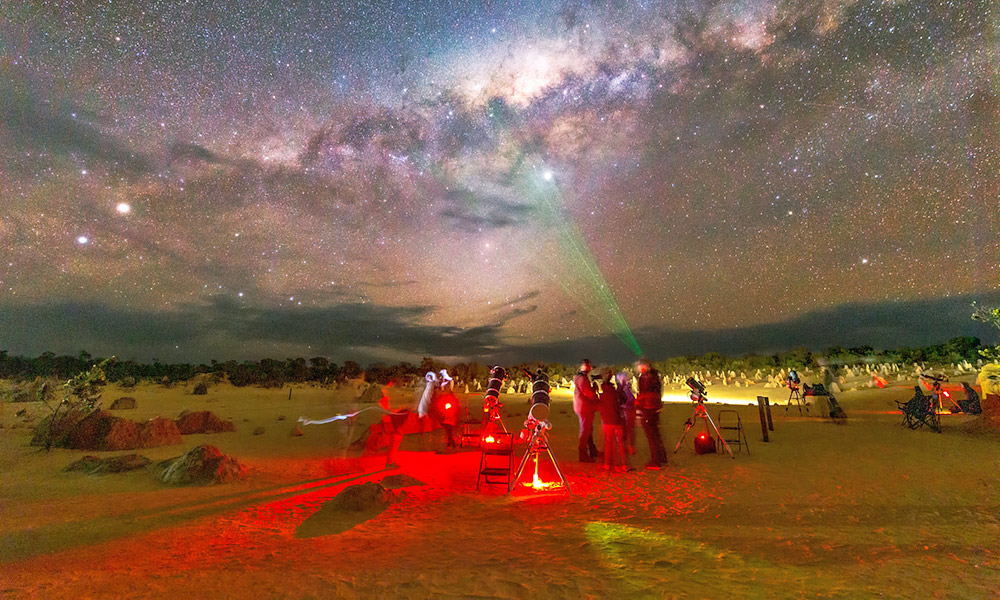With its bright night skies, low levels of light pollution in rural areas, and good vantage sites like Mount Kilimanjaro, Tanzania makes a beautiful destination for astro-tourism. Astro-tourism is any tourism that involves the night sky or visiting facilities related to astronomy, like observatories, and combining that with a broader sense of ecotourism where interactions with nature is what the visitor experience is about.
This travel is done for astrophotography, astronomy-related excursions, and stargazing. Tanzania has enormous potential to get into this sector as astro-tourism grows worldwide.
Geographical Advantages of Tanzania
Tanzania makes an excellent location for astro-tourism for a variety of reasons. First, tourists may view 95% of the evening sky because of the nation’s proximity to the equator. Secondly, Tanzania’s numerous national parks and game reserves provide breathtaking natural backdrops for stargazing.
Third, Tanzania has several well-equipped astronomical observatories, including the Tanzanian National Telescope and the Mbeya Astronomical Observatory. Visitors to these observatories get the chance to learn about astronomy and view celestial objects using large telescopes.
Tanzania offers a variety of options for astro-tourism. Visitors can participate in scientific research initiatives, go on stargazing excursions, and even visit astronomical observatories. The Southern Cross and Magellanic Clouds highlights for stargazers from the Northern Hemisphere are visible.
Annually, Tanzanians may already observe a number of astronomical events. The Perseid meteor shower peaks in August and can be seen with the unaided eye from dark areas up to 100 meteors per hour. Regular solar eclipses are another occurrence, and one will pass straight over northern Tanzania in 2063 (Science News). The nation’s volcanoes also provide opportunities for viewing aurorae, celestial bodies, and noctilucent clouds.
Tanzania features several tall mountains and vast plains with clear vistas perfect for astronomy. The Ngorongoro Crater rim at 2,286m, Mount Meru at 4,565m, and Mount Kilimanjaro at 5,895m all offer elevated observation locations above cloud cover and lessen atmospheric interference.
The Mweka Astronomy Centre is open for visitors to explore, or they may relax and take in the Milky Way from their tent. The Ngorongoro Crater is another well-liked astro-tourism location in Tanzania. Wildlife from many different species can be found in the Ngorongoro Crater, a UNESCO World Heritage Site. The Ngorongoro Crater Research Centre is open to visitors, and they may also take stargazing tours or relax and take in the vista of the Milky Way from the crater rim.
Some of the best stargazing places are in areas like Lake Natron, Serengeti National Park, and Tarangire National Park because of their seclusion and lack of light pollution. Due to Tanzania’s closeness to the equator, the climate is also pleasant year-round.
The growing interest in Astro-tourism
The ecotourism and sustainable travel niches are expanding, and so is astro-tourism. According to a study, the global market for Astro-tourism is currently mostly untapped and might be worth $300 billion. Tanzania may gain a lot from Astro-tourism with the correct infrastructure and promotion.
The University of Dar es Salaam has an active astronomy group that conducts observations and events for solar eclipses and meteor showers. The locally registered Association of Space Science and Astronomy of Tanzania (ASSAT) likewise conducts regular sessions in stargazing, and planets identification in collaboration with the Open University of Tanzania. Local communities are also getting involved, with foreign astronomers training youth groups in northern Tanzania to be astro-guides.
For specialized camping and stargazing experiences, Maasai tribe members in the Ngorongoro Conservation Area have joined Astro-tourism businesses like Stellar Safaris. Their innate understanding of star-based navigation offers a genuinely enriching encounter for guests. The Maasai culture is preserved while the local community prospers economically.
Government Support Is Indispensable
To increase astronomy tourism in Tanzania, some preliminary initiatives have been taken. Events for stargazing have been held by regional groups like Tanzania Stargazers in Arusha National Park and at the University of Dar es Salaam.
A few travel agencies now provide Astro-tourism excursions on their itineraries. However, Tanzania might be able to reach its full potential in this expanding industry with further investment in infrastructure like observatories, telescopes, and specialist travel packages.
However, Tanzania will require legislative measures and financial support from the government to boost astronomy tourism. This entails creating facilities like high-altitude astronomy observatories and specialized astro-parks in isolated areas with dark skies. Companies offering astro-tourism events and regional training programs may benefit from tax benefits.
Tanzania might become a top African Astro-tourism destination by utilizing its natural resources and the rising interest in space exploration. With proper planning and advertising, stargazing excursions, animal watching, and cultural tourism might significantly improve Tanzania’s tourism economy in the coming years. The stars of East Africa shine brighter and brighter as the gloomy skies that once covered much of the developed world are rapidly disappearing.
Tanzania will become known as a destination for Astro-tourism if it partners with international space agencies and astronomers to support programs and activities. Astro-tourism is possible with appropriate supervision and preparation. Astrotourism has the potential to grow into a significant source of income for Tanzania and contribute to the preservation of the nation’s starry skies for future generations with careful planning and management.


Very useful article for the opportunities that Tanzania holds for Astrotourism, although at the moment the opportunities are very few for people to come and tour the skies from Tanzania. More investment in observatories are needed to be set up in the obvious places in all the numerous National Parks that we have as well as in tourist hotels. There are currently no observatories in Tanzania that can cater for Astrotourism. Local entrepreneurship has to be encouraged in rural areas to combine cultural tourism and Astrotourism.